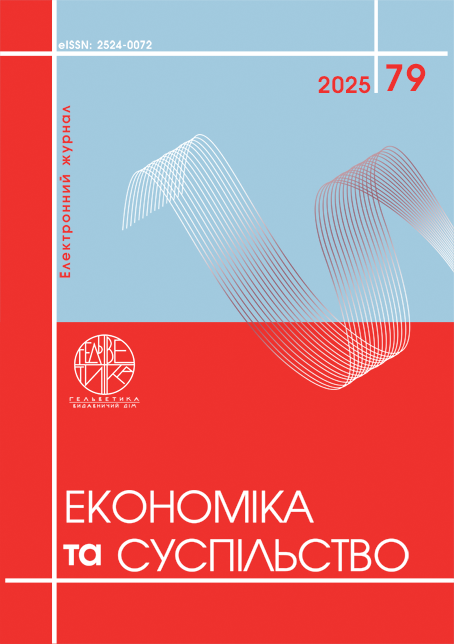ADAPTIVE BRAND MANAGEMENT IN THE POST-GLOBALIZATION ERA: BETWEEN REGIONAL REALITIES AND GLOBAL CHALLENGES
Abstract
This article explores the specific features of adaptive brand management in international companies under post-globalization conditions. It analyzes how shifts in the global context—driven by geopolitical conflicts, economic fragmentation, rising nationalism, and digital transformation—necessitate a rethinking of traditional brand management models. The study outlines key regional factors influencing the development of adaptive strategies, including the cultural, political, and social specifics of local markets. New approaches to brand governance are identified, such as agile management, decentralization, localization, and digital personalization. The research emphasizes that these transformations redefine the nature of brand management, shifting it from a standardized, globally unified approach toward flexible, context-sensitive frameworks that account for cultural heterogeneity and regional diversity. It highlights the growing strategic importance of cultural intelligence, stakeholder engagement, and digital adaptability in ensuring brand consistency across fragmented global markets. The article also explores how international corporations balance global brand identity with local authenticity, integrating corporate values into diverse cultural and institutional environments. The article presents real-world case studies of transnational companies that demonstrate the effectiveness of adaptive strategies in a complex and unpredictable global business environment. A conceptual adaptive model of brand management is proposed for conditions shaped by post-globalization factors. The findings confirm that adaptive brand management is a coherent paradigm that integrates politically attuned positioning, the regionalization of brand architecture, social responsibility, personalized communication, agile approaches, and the development of the brand as an open ecosystem. The analysis concludes that adaptability has become a critical condition for preserving brand value, reputation, and competitiveness in the post-globalization era, ensuring brands remain relevant, resilient, and socially responsive.
References
Kapferer, J.-N. The New Strategic Brand Management. Kogan Page. 2012. 405-409 c.
Mostepaniuk, A. Corporate Governance. InTech. 2017. 4-5 c.
Sheth, J. Post-COVID marketing: adaptive strategies. Journal of Business Research, 116, 2020. 280–283 c.
Kotler, P., & Caslione, J. A. Chaotics: The Business of Managing and Marketing in the Age of Turbulence. AMACOM. 2009. 107-109 c.
Burrell, D. N., Lewis, E. J., & Richardson, K. Adaptive marketing, management strategy, and technology innovation in beverage and hospitality markets. International Journal of Innovation in the Digital Economy (IJIDE), 14(1), 2023. 1-10 c.
Ghemawat, P. Redefining Global Strategy: Crossing Borders in a World Where Differences Still Matter. Harvard Business Review Press. 2007. 101-103 c.
Holt, D. Branding in the Age of Social Media. Harvard Business Review, 94(3), 2016. 40–50 c.
Fournier, S., & Avery, J. The uninvited brand. Business Horizons, 54(3), 2011. 193–207 c.
Shams, R., Chatterjee, S., & Chaudhuri, R. Developing brand identity and sales strategy in the digital era: Moderating role of consumer belief in brand. Journal of Business Research, 2024. 179 c.
Pöhlmann, M., Seitz, J., Jambrino-Maldonado, C., & de las Heras-Pedrosa, C. Conceptualizing Agile Branding: Dimensions and antecedents for managing brands in a dynamic environment. Administrative Sciences, 14(6), 2024. 112 c.
Rigby, D. K., Sutherland, J., & Takeuchi, H. Embracing Agile. Harvard Business Review, 94(5), 2016. 40–50 c.
Aaker, D. A., & Joachimsthaler, E. Brand Leadership: Building Assets In an Information Economy. Free Press. 2000. 63 c.
Piller, F. T., & Walcher, D. Toolkits for idea competitions: A novel method to integrate users in new product development. R&D Management, 36(3), 2006. 307–318 c.
Wheeler, A. Designing Brand Identity: An Essential Guide for the Whole Branding Team. Wiley. 2017. 34-51 c.
Microsoft Design. Inclusive Design Principles. 2021. URL: https://inclusive.microsoft.design/ (дата звернення: 23.08.2025).
Kapferer, J.-N. (2012). The New Strategic Brand Management. Kogan Page. pp. 405-409
Mostepaniuk, A. (2017). Corporate Governance. InTech. pp. 4-5
Sheth, J. (2020). Post-COVID marketing: adaptive strategies. Journal of Business Research, 116, pp. 280–283.
Kotler, P., & Caslione, J. A. (2009). Chaotics: The Business of Managing and Marketing in the Age of Turbulence. AMACOM. pp. 107-109
Burrell, D. N., Lewis, E. J., & Richardson, K. (2023). Adaptive marketing, management strategy, and technology innovation in beverage and hospitality markets. International Journal of Innovation in the Digital Economy (IJIDE), 14(1), pp. 1-10
Ghemawat, P. (2007). Redefining Global Strategy: Crossing Borders in a World Where Differences Still Matter. Harvard Business Review Press. pp. 101-103
Holt, D. (2016). Branding in the Age of Social Media. Harvard Business Review, 94(3), pp. 40–50.
Fournier, S., & Avery, J. (2011). The uninvited brand. Business Horizons, 54(3), pp. 193–207.
Shams, R., Chatterjee, S., & Chaudhuri, R. (2024). Developing brand identity and sales strategy in the digital era: Moderating role of consumer belief in brand. Journal of Business Research, p. 179
Pöhlmann, M., Seitz, J., Jambrino-Maldonado, C., & de las Heras-Pedrosa, C. (2024). Conceptualizing Agile Branding: Dimensions and antecedents for managing brands in a dynamic environment. Administrative Sciences, 14(6), p. 112
Rigby, D. K., Sutherland, J., & Takeuchi, H. (2016). Embracing Agile. Harvard Business Review, 94(5), pp. 40–50.
Aaker, D. A., & Joachimsthaler, E. (2000). Brand Leadership: Building Assets In an Information Economy. Free Press. p. 63
Piller, F. T., & Walcher, D. (2006). Toolkits for idea competitions: A novel method to integrate users in new product development. R&D Management, 36(3), pp. 307–318.
Wheeler, A. (2017). Designing Brand Identity: An Essential Guide for the Whole Branding Team. Wiley. pp. 34-51
Microsoft Design (2021). Inclusive Design Principles. URL: https://inclusive.microsoft.design/

This work is licensed under a Creative Commons Attribution 4.0 International License.


